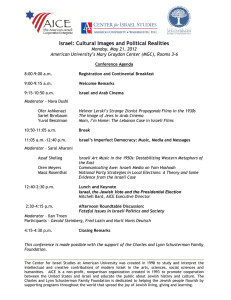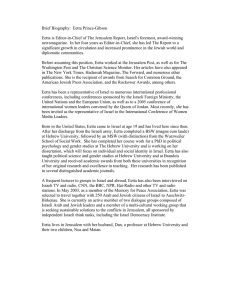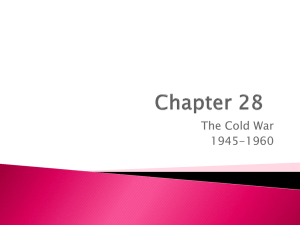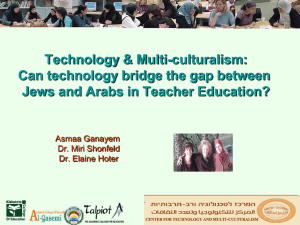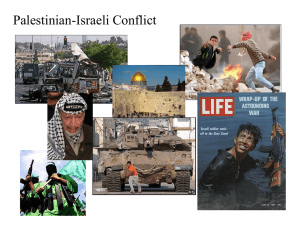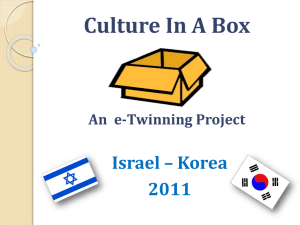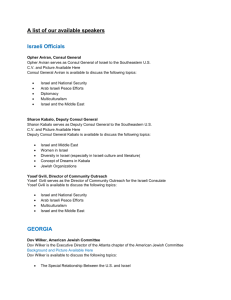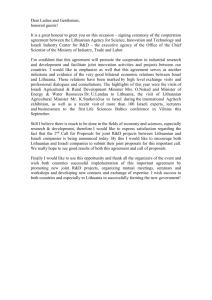Conflict in the Middle East: The Last ten years
advertisement
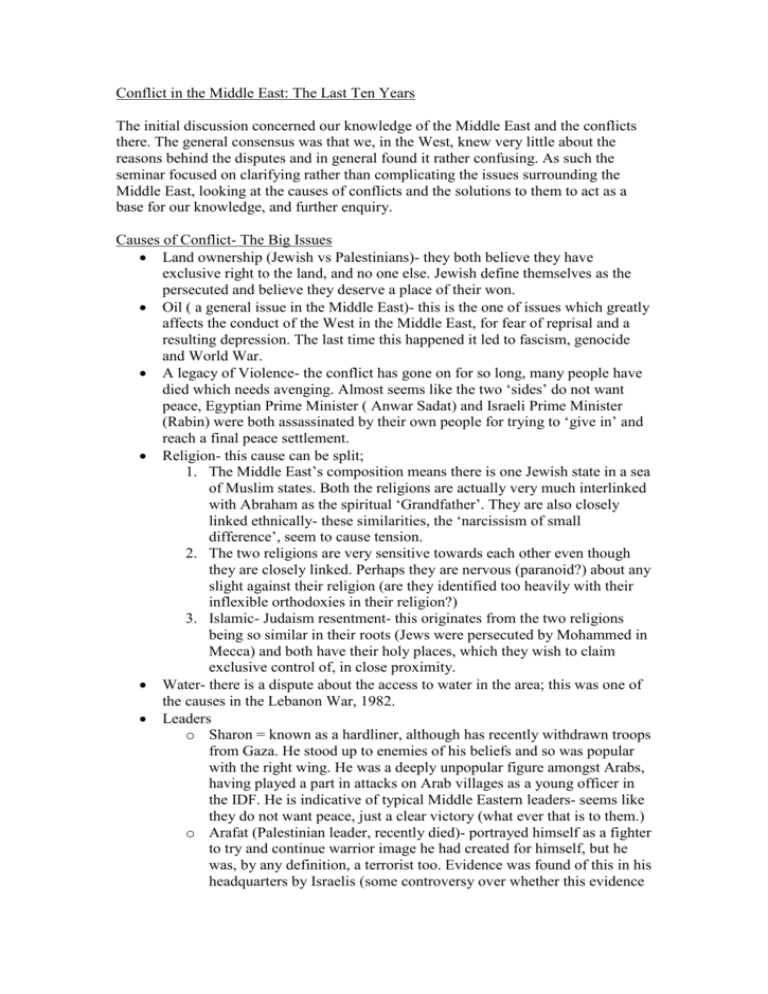
Conflict in the Middle East: The Last Ten Years The initial discussion concerned our knowledge of the Middle East and the conflicts there. The general consensus was that we, in the West, knew very little about the reasons behind the disputes and in general found it rather confusing. As such the seminar focused on clarifying rather than complicating the issues surrounding the Middle East, looking at the causes of conflicts and the solutions to them to act as a base for our knowledge, and further enquiry. Causes of Conflict- The Big Issues Land ownership (Jewish vs Palestinians)- they both believe they have exclusive right to the land, and no one else. Jewish define themselves as the persecuted and believe they deserve a place of their won. Oil ( a general issue in the Middle East)- this is the one of issues which greatly affects the conduct of the West in the Middle East, for fear of reprisal and a resulting depression. The last time this happened it led to fascism, genocide and World War. A legacy of Violence- the conflict has gone on for so long, many people have died which needs avenging. Almost seems like the two ‘sides’ do not want peace, Egyptian Prime Minister ( Anwar Sadat) and Israeli Prime Minister (Rabin) were both assassinated by their own people for trying to ‘give in’ and reach a final peace settlement. Religion- this cause can be split; 1. The Middle East’s composition means there is one Jewish state in a sea of Muslim states. Both the religions are actually very much interlinked with Abraham as the spiritual ‘Grandfather’. They are also closely linked ethnically- these similarities, the ‘narcissism of small difference’, seem to cause tension. 2. The two religions are very sensitive towards each other even though they are closely linked. Perhaps they are nervous (paranoid?) about any slight against their religion (are they identified too heavily with their inflexible orthodoxies in their religion?) 3. Islamic- Judaism resentment- this originates from the two religions being so similar in their roots (Jews were persecuted by Mohammed in Mecca) and both have their holy places, which they wish to claim exclusive control of, in close proximity. Water- there is a dispute about the access to water in the area; this was one of the causes in the Lebanon War, 1982. Leaders o Sharon = known as a hardliner, although has recently withdrawn troops from Gaza. He stood up to enemies of his beliefs and so was popular with the right wing. He was a deeply unpopular figure amongst Arabs, having played a part in attacks on Arab villages as a young officer in the IDF. He is indicative of typical Middle Eastern leaders- seems like they do not want peace, just a clear victory (what ever that is to them.) o Arafat (Palestinian leader, recently died)- portrayed himself as a fighter to try and continue warrior image he had created for himself, but he was, by any definition, a terrorist too. Evidence was found of this in his headquarters by Israelis (some controversy over whether this evidence was ‘found’ on purpose to maintain image he was supporting the radical ideas?) What have the attempted solutions been? (e.g. To Suicide Bombers) An eye for an eye- attack back! Jewish belief- cultural. Solutions to terrorism is to fight back with same proportion = a form of Realpolitik (realistic, or tough, politics) Negotiations- They talk ‘tough’ but are starting to make concessions e.g. Sharon withdrawing troops. Diplomacy often works to produce more progressmore than in waging wars. Camp David was an attempt at negotiations in the United States, they invited leaders to talk to one another. At the beginning they would not even be in same room as each other, but eventually President Carter got them laughing and joking with each other. Clinton attempted this again most recently with some success. George Bush realised Israeli’s would not try and get along with Arafat- his death may have helped Bush. Idea of a divide- idea of separating the areas with a wall through Palestine to keep out Suicide Bombers- but this would divide urban centres in Palestine from the Gaza strip. A free access road proposed between the areas to combat issue of isolation of areas. Disputed by Palestinians. Palestinian solution to Israeli occupation has been an intifada (uprising) i.e. throwing rocks at Israeli forces’ tanks and soldiers as an anguished protest. This is often done by children; many innocent people get caught in the crossfire. Tanks on patrol-is this really necessary? Are the Israeli’s being heavy handed? This is something they are accused of, but they claim more of their people die each year so they argue robust responses are necessary. The West is generally critical. Arab states have fought Israel and have always losto Why is this? Is it US backing? – this is not quite true, the US back both Israel and Arab states (cannot upset one side because of the oil) The US often leaned on Israel to make concessions. o Why does the US openly support Israel? This is partly due to the large US Jewish lobby/population (But US policy is not driven by Jews! There are Muslims, Christians etc in high positions in US as well.)Religion perhaps plays a part in politics but is not as overt as suggested. American national interests come first, not religion. Bush and Blair’s plan for reforming Middle East is to democratize the Middle East- starting with Iraq, and then perhaps Syria and Saudi Arabia should follow which will put pressure on the other countries, like Kuwait and Yemen, to follow. o Why do they think this is best? Believe if the ‘normal’ people in the Middle East are given a voice then they are less likely to turn towards extremes (Link between 9/11 and Iraq War.) Problem with this is there are some difficult assumptions- 1) that Iraq will end up a flourishing democracy, 2) that other countries will follow, why would the ruling elites just give up their power? Once again the Seminar seems to have thrown up just as many questions as it has answered, but has outlined the basics of the Middle East conflict. Media Portrayal of war o Iconography- iconic narratives not necessarily representative. o Memorialisation- film, literature, war memorials, bereavement and loss, museums and monuments etc. Used to be statues of leaders, but what about the troops ( e.g. Nelson’s Column in Trafalgar square- the sailors story is minimal at the bottom.) o Middle East- people killed are memorialised as martyrs- Suicide Bombers (events and parades where children dress up as suicide bombers.) Suicide Bombers have posters put up, hailed as icons. Israelis, huge memorial in Israel for Holocaust- define themselves as the persecuted. Memorials, as physical spaces, ideas and texts, are powerful and pervasive. They inform and influence the behaviour of many actors in the SW Asian drama.

